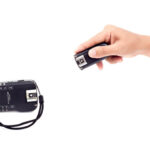One type of photography I would love to try is street photography. I love capturing random moments from people on the street; I think it’s one of the most honest types of photography there is. However, it’s rare that I have the courage to approach somebody for a picture or snap one of strangers down the street. This is why the following video hit so close to home. In it, a photographer deals with what he claims is blatant discrimination:
In the video, Jason Lanier encounters an official essentially banning him from shooting on a public scene. The official reason cited? A lack of permit and insurance issued by the local authorities. Even though the location is public property, a place where you can freely walk around, photography is not allowed with a professional camera. The issue lies, as Lanier puts it, in the fact that anybody can take pictures with cell phones or other “non-professional” cameras. But professional photographers are bound to a lengthy, expensive process just to be allowed the same rights as anybody else. (Via PetaPixel.)
Later on in the video, a park ranger approaches the group taking photos and also asks them to provide a permit for shooting in that area, saying,
“When you start setting up more than just a tripod and a camera, we get into the realm where we want people to have commercial permits.”
Which is understandable, but only if you are making money off of the shoot. If it’s non-profit (Lanier says it’s just a Meetup group on an outing), why do the same rules apply for professional equipment?

The gear shown here triggered both a park ranger and an official to ask for a permit from the photographer.
In the interest of fairness, let’s examine the other side of the issue.
Many professional photographers might deny that they’re shooting with commercial intent. In that case, a professional photographer’s permit not only makes sense, but it’s the right approach. That being said, I would like to see a more nuanced solution that doesn’t lump together professional photographers shooting commercially with amateurs that have professional equipment.
What’s your take on this? Have you ever had a similar incident? Let us know in the comments!
Like This Article?
Don't Miss The Next One!
Join over 100,000 photographers of all experience levels who receive our free photography tips and articles to stay current:






I get that they don’t want “commercial” photography without a permit, but the problem is many “consumer” cameras are perfectly capable of taking a salable photo, and even if the commercial world doesn’t accept it, well, look at all the YouTube thousandaires posting cell-phone videos!
Yes, things have gotten crazy! I wrote about my experience in my local public park:
http://bjschupp.blogspot.com/2014/07/the-lens-incites-paranoia.html
Are you serious!!! OMG. That just goes to show you how screwed up this world really is. We the taxpayers pay for those parks to exist. You should be able to take photos on any tax payer owned land period. WITHOUT PAYING FEES. Unless of course it is a big production type shoot.
In England, the Royal Photographic Society provides a special card for members to show in case they are stopped. I haven’t tried it but the word Royal does have a certain magic.
Casino Niagara played a message at the start of their show saying “No video recording, no audio recording, no flash photography.” Then during the show they came by and told me I could not take photos, though I was taking them without flash!
Casino Rama frequently plays a similar message. On one occasion the usher told me non-flash photography was permitted. When I took out my camera a security guard came by and said I could not take photos. Exchanging email with the casino, they don’t want those watching the show to be able to take good photos. Showing everyone near you the live monitor of a cell phone or P&S is fine. Using a real camera that doesn’t light the room is unacceptable because photo quality is good enough to sell and they want to prevent that.
It is blatant discrimination.
At a local outdoor mall, I took a photo of a skylight that had cool patterns in the water on it. Mall security appeared and told me I couldn’t take photos because I was a professional. An exchange of emails with the mall’s owners resulted in their promising to provide better training to their security people.
Apparently the meetup group didn’t get Joe McNally’s memo to use a V.A.L. (Voice Activated Lightstand)!
http://merch.joemcnally.com/products/v-a-l
Seriously though, anyone who doesn’t know the history the struggle to preserve our precious National Parks ought to make an effort to get the big picture. Frank Dean and his staff at the Golden Gate Recreational Area are friendly, conscientious and dedicated to ensuring our national treasures can be enjoyed by everyone. It is not unreasonable for them to guests adhere to reasonable park policies. For instance, I wouldn’t want to have a bunch of drones flying overhead when I’m trying to enjoy the natural beauty of our national parks, even though I own several myself. Similarly, I can’t see hauling out a 6 foot Octobox on a 25 foot High-high boy C-Stand and start taking staged photos of a handful of models in their wardrobe (be it for a Meetup group or whatever).
http://www.parksconservancy.org/about/newsletters/park-e-ventures/2015/03-deanretires.html
He’s running a Meetup Group, which will typically charge $60-$80 per person to participate in a class like this. The model may get paid (probably) and may give or charge for releases. This is not a guy wandering down the beach with friends, it’s a commercial enterprise. He’s being hypocritical and dishonest.